

Passé simple ou imparfait. Loris Acot, professeur de français au collège, a créé cette activité pour permettre aux élèves de s’entraîner à déterminer s’il faut utiliser le passé simple ou l’imparfait dans un récit au passé et à conjuguer ces temps.
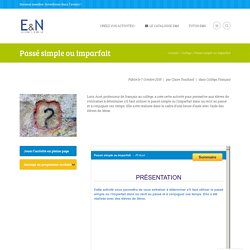
Elle a été réalisée dans le cadre d’une heure d’aide avec l’aide des élèves de 3ème. Jouer l’activité en pleine pageAncrage au programme scolaire. 5 Most Common Questions about the French Simple Past Tense. French language learning is a winding path of complex conjugations, tenses, and moods.
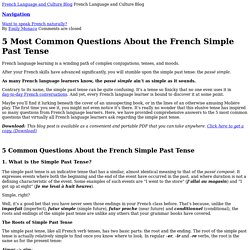
After your French skills have advanced significantly, you will stumble upon the simple past tense: the passé simple. As many French language learners know, the passé simple ain’t as simple as it sounds. Contrary to its name, the simple past tense can be quite confusing. It’s a tense so finicky that no one even uses it in day-to-day French conversations. And yet, every French language learner is bound to discover it at some point. Maybe you’ll find it lurking beneath the cover of an unsuspecting book, or in the lines of an otherwise amusing Molière play. 1. The simple past tense is an indicative tense that has a similar, almost identical meaning to that of the passé composé.
French Passé Simple. The French Corner: Le passé simple / Simple Past. This tense is somewhat rare.

Only advanced students should attempt mastering this tense. Le passé simple (past historic) - Lingolia French. Introduction We generally use the passé simple in written language.
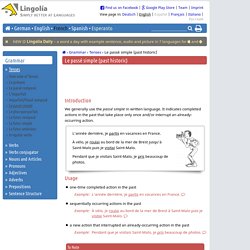
It indicates completed actions in the past that take place only once and/or interrupt an already-occurring action. Beispiel L’année dernière, je partis en vacances en France. À vélo, je roulai au bord de la mer de Brest jusqu’à Saint-Malo puis je visitai Saint-Malo. Pendant que je visitais Saint-Malo, je pris beaucoup de photos. Usage. 4 Rules In Transforming French Verbs Into Its Simple Past (Passé simple)
Where could you encounter Passé simple (the historical and formal tense)?
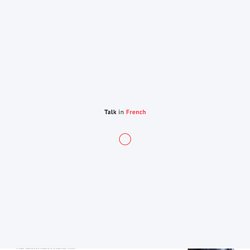
You will probably not see it in a friendly chit-chat, maybe not even in this kind of blog article if it is translated into French. You will probably say “so what is the point of knowing it? I am not a native speaker, and I can understand French text without it”. Ok, that sounds fine, but imagine one day, you are reading an amazing novel, and encounter a “strange verb” that you have never seen before. VERB CHART: LE PASSE SIMPLE: all verbs. Histoires au passé composé-imparfait.mp4. Chrono743 1. French grammar. Preterite - definition of preterite by The Free Dictionary. Also found in: Wikipedia. pret·er·ite or pret·er·it (prĕt′ər-ĭt) adj.
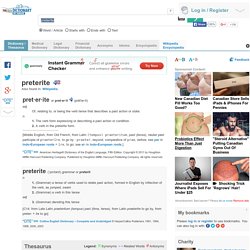
Of, relating to, or being the verb tense that describes a past action or state. n. 1. 2. [MiddleEnglish,fromOldFrench,fromLatin(tempus) praeteritum, past (tense), neuterpastparticiple of praeterīre, to go by : praeter, beyond, comparative of prae, before; seeper in Indo-European roots + īre, to go; seeei- in Indo-European roots.] American Heritage® Dictionary of the English Language, Fifth Edition. Preterite (ˈprɛtərɪt) grammar or preterit n 1. How to form the perfect tense (passé composé) in French. Use of past tenses in French - About-France.com. The preterite and perfect tenses There are four indicative past tenses in French, plus less common subjunctive forms.
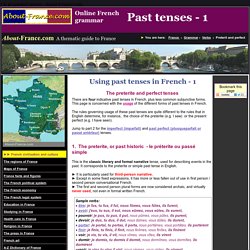
This page is concerned with the usage of the different forms of past tenses in French. The rules governing usage of these past tenses are quite different to the rules that in English determine, for instance, the choice of the preterite (e.g. I saw) or the present perfect (e.g. I have seen). Jump to part 2 for the imperfect (imparfait)and past perfect (plusqueparfait or passé antérieur) tenses. 1. This is the classic literary and formal narrative tense, used for describing events in the past. . ► It is particularly used for third-person narrative Examples:He opened the window and looked at the crowd. - Il ouvrit la fenêtre et regarda la foule The president stood up and began to talk Le président se leva et se mit à parler.When he saw the size of the deficit, he was frightened Quand il vit la taille du déficit, il eut peur 2. . ► Agreement of the past participle: Passé simple - French Simple Past Tense - French Preterite. The past historic (passé simple)
The past historic, usually called the passé simple in French, also referred to as the preterite by some authors, is a past tense essentially used in written narratives of a classical style.
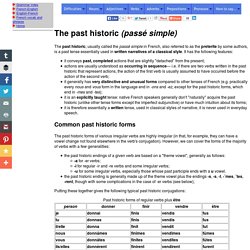
It has the following features: The past historic forms of various irregular verbs are highly irregular (in that, for example, they can have a vowel change not found elsewhere in the verb's conjugation). However, we can cover the forms of the majority of verbs with a few generalities: the past historic endings of a given verb are based on a "theme vowel", generally as follows: -a for -er verbs; -i for regular -ir and -re verbs and some irregular verbs; -u for some irregular verbs, especially those whose past participle ends with a u vowel.